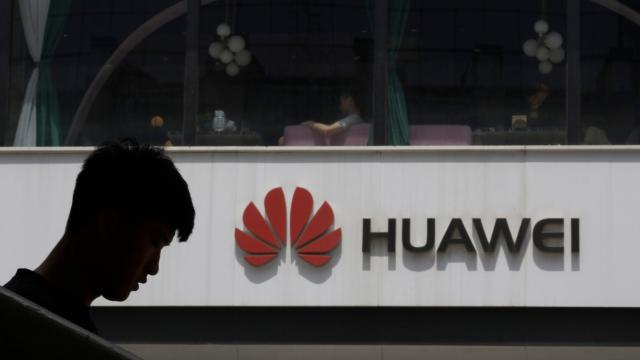Chinese tech giant Huawei has cancelled the planned launch of a new MateBook laptop at the CES Asia 2019 trade show in Shanghai this week due to sweeping U.S. sanctions against the company, Ars Technica reported on Wednesday.
News of the cancellation first came via the Information on Tuesday. According to CNBC, Huawei consumer division CEO Richard Yu confirmed that due to being placed on the U.S.
Entity List, Huawei “cannot supply the PC.” Yu added that the matter was “unfortunate” and any future launch date “depends on how long the Entity List will be there.” As the Information noted, laptops are just a small part of the roughly half of Huawei’s $154 billion revenue generated by its consumer electronics business, but Huawei was expecting its PC business to turn profitable in 2019.
Donald Trump’s administration passed an executive order last month claiming a national security emergency which barred U.S. companies from using technology made by companies that pose a significant security risk.
Huawei was a clear target of the order. Shortly after, the Commerce Department added Huawei and 70 affiliates to the so-called Entity List.
The listing severely limits Huawei’s business with the states; it can no longer buy U.S. tech without U.S. approval, which limits not only parts and components but any product deemed to have been made with significant U.S. input, like software or technology.
However, the Commerce Department also left open a 90-day window in which Huawei has a “temporary general licence” to do business with U.S. firms “necessary to maintain and support existing and currently fully operational networks and equipment, including software updates and patches, subject to legally binding contracts and agreements.” That expires on Aug. 19.
Drama over Huawei has become a centrepiece to the ongoing U.S.-China trade war, which has recently escalated to the point where the New York Times recently reported there is “increasing evidence” of slowing economic growth worldwide.
The U.S. has slapped Huawei with trade theft and fraud charges and is seeking the extradition of one of its top-ranking executives over allegations of banking fraud and Iran sanctions violations. U.S. intelligence agencies have been issuing warnings (though with little publicly released evidence) that it was secretly funded by, and its telecom gear could be bugged by Chinese security and intelligence services.
Huawei has strongly denied any involvement in espionage and argued that the U.S. government is simply trying to strong-arm the company because it is beating the competition in the race to 5G.
It is also suing the U.S. government, claiming it has been unfairly singled out by the feds for special treatment.
There’s also the possibility that the Trump administration is attacking Huawei, one of the crown jewels of China’s tech industry, more for the purposes of gaining leverage in the trade war—though if that is the case it may backfire, with China threatening its own retaliatory measures against U.S. firms.
Huawei purchases about $29 billion in semiconductors each year, according to Evercore estimates cited by CNBC, much of it from American firms.
According to Ars Technica, Intel and ARM have also recently made moves to distance themselves from Huawei. Qualcomm and Broadcom, major chip supplies, have done the same.
Huawei’s smartphone business designs its own processors and does not appear to be affected yet, CNBC noted, but it could lose access to Google’s Android OS after the 90 day licence expires, and the company uses U.S. technology elsewhere in its phones.
(Google has warned that forcing Huawei to rapidly design and roll out a slapdash version of Android based on its open source version poses its own security risks.)
Ars Technica also flagged a piece in the Chinese state-run Global Times newspaper, which disputed the news of the MateBook delay.
“Huawei will release a new laptop product in July, with different models and configurations compared with previous series such as the MateBook and HonorBook, a source close to the matter confirmed to the Global Times,” the paper wrote. “… The new laptop will be equipped with the Windows operating system, the source said, in contrast to rumours about Microsoft halting cooperation with Huawei.”
The Global Times’ source “refuted reports that Huawei had halted laptop production due to the export control imposed by the Trump administration amid the escalating trade war,” it wrote, adding that “industry leaders” had called its persistence an “inspiring move.”
